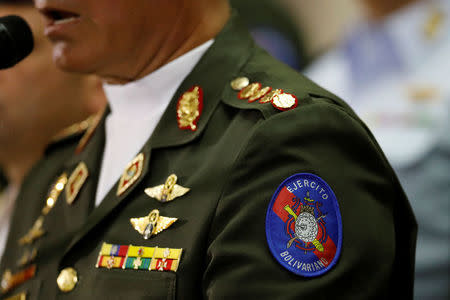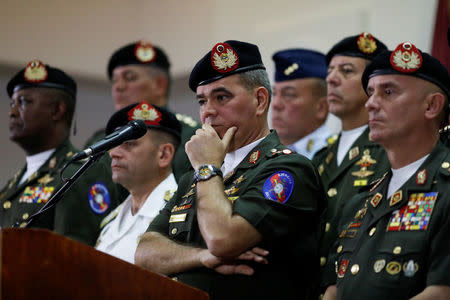Venezuela derides U.S. comments on military ouster of Maduro
By Alexandra Ulmer and Vivian Sequera
CARACAS (Reuters) - Venezuela condemned on Friday U.S. comments that its own military could topple President Nicolas Maduro and said a Latin American tour by Secretary of State Rex Tillerson was seeking a regional "intervention" against the socialist government.
Accusing Washington of seeking to undermine democracy in Latin America and return to the days of "imperialism," Defense Minister Vladimir Padrino lashed out at Tillerson during a broadcast on state television.
"Every day he distances himself more from diplomacy to enter into war-mongering. You have no moral authority," said Padrino, flanked by armed forces' top brass who swore loyalty to Maduro.
"This man... will try to persuade Latin America governments to intervene in Venezuela. That's a publicity stunt," he added, blaming U.S. President Donald Trump's sanctions for economic hardship in Venezuela.
On Thursday, Tillerson raised the prospect of a Venezuelan military coup ahead of a five-day tour of Latin America.
Discussing Venezuela, the U.S. official said militaries in Latin America often "handled" transitions from bad governments, but insisted he was not advocating "regime change."
"If the kitchen gets a little too hot for him, I am sure that he's got some friends over in Cuba that could give him a nice hacienda on the beach and he could have a nice life over there," Tillerson said, referring to 55-year-old Maduro, who has a close relationship with Cuba's communist government.
Many opposition leaders would love for Maduro to seek exile abroad. The former bus driver and union leader is widely disliked in Venezuela due to a brutal economic crisis that has sparked malnutrition, disease and mass emigration.
But even some anti-government activists fear Washington's heavy-handed approach will only foster unity between the Socialist Party and the armed forces, as they would be loathe to seem to be taking orders from Washington.
The U.S. comments will likely also cause unease in capitals of Latin America, where memories are rife of U.S. backing for right-wing dictators during the Cold War. That could hamper Tillerson's ability to reach a consensus on Venezuela during his trip.
Senior military leaders have consistently stood by Maduro, whom critics accuse of turning Venezuela into a dictatorship and wrecking its economy. But discontent among the rank-and-file, especially at their own economic penuries, is evident.
There have been some small uprisings against Maduro from within the security forces. A National Guard captain led an attack on a barracks but was later arrested, and a police helicopter pilot lobbed grenades at government buildings but was tracked down and killed last month.
Venezuela's opposition leaders have long urged the military to take action to force Maduro to follow the constitution. He maintains the United States and opposition parties are part of an international right-wing conspiracy to oust him and get their hands on the OPEC nation's oil wealth.
Trump has himself suggested possible military intervention in Venezuela, though that was widely rejected in Latin America. Trump has imposed individual and economic sanctions on Venezuela's government, accusing it of rights abuses and corruption.
Venezuelan officials say Tillerson is particularly bitter towards them because he was chief executive of Exxon Mobil Corp when late leader Hugo Chavez nationalized one of its oil projects in the South American nation a decade ago.
(Additional reporting by Girish Gupta, Andreina Aponte, Andrew Cawthorne; Writing by Alexandra Ulmer and Andrew Cawthorne; Editing by Bernadette Baum and Andrew Hay)




